

Defination of Stress. Definition of Stress. Stress: In a medical or biological context stress is a physical, mental, or emotional factor that causes bodily or mental tension.
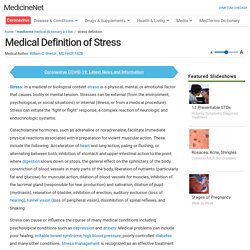
Stresses can be external (from the environment, psychological, or social situations) or internal (illness, or from a medical procedure). Stress can initiate the "fight or flight" response, a complex reaction of neurologic and endocrinologic systems. Catecholamine hormones, such as adrenaline or noradrenaline, facilitate immediate physical reactions associated with a preparation for violent muscular action.
Stress can cause or influence the course of many medical conditions including psychological conditions such as depression and anxiety. Medical problems can include poor healing, irritable bowel syndrome, high blood pressure, poorly controlled diabetes and many other conditions. Panic attacks are repeated attacks of fear that can last for several minutes. Symptoms of Stress. Physical Effects of Stress on the Body. Stress affects us all.
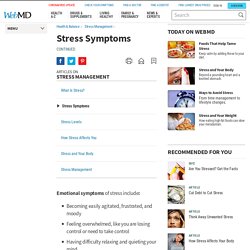
Stress in young adults undergraduates. Age Distribution of Undergraduate Students. What causes the stress in young adult undergraduates. Why are students at university so stressed? Mounting social and academic pressures mean that higher education can be a challenge for any student.
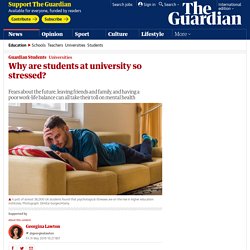
A Uni Health study found that 80% of those studying in higher education reported symptoms of stress or anxiety, while one NUS survey found that nine in 10 students experienced stress. Uncertainty around Brexit and rising living costs mean that many students don’t feel confident about finding a job. Alex, an international relations and politics student at the University of Leicester, says he’s constantly worried about graduate life. “There’s that fear of having to adjust back to life back home. I always think, what sector do I want to work in? Hannah Morrish, a psychotherapist and the higher education lead at The Student Room, says students are increasingly questioning whether university is worth the cost.
Leaving the structures of home and family for the first time can often exacerbate mental health problems. Helping college students cope with an epidemic of anxiety and stress on campus. Potential detrimental effects to young adult undergraduates. Depression. Depression is one of the most common mental health illnesses in the United States, affecting about .
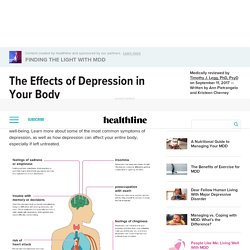
Depression is technically a mental disorder, but it also affects your physical health and well-being. Learn more about some of the most common symptoms of depression, as well as how depression can affect your entire body, especially if left untreated. Feeling sad or anxious at times is a normal part of life, but if these feelings last more than two weeks they could be symptoms of depression. It’s estimated that each year 17 million American adults will experience depression. However, clinical depression, especially left untreated, can interrupt your day-to-day life and cause a ripple effect of additional symptoms.
Depression affects how you feel and can also cause changes in your body. Central nervous system Depression can cause a lot of symptoms within the central nervous system, many of which are easy to dismiss or ignore. Symptoms in children Digestive system Suicide prevention. Generalised Anxiety Disorder. Anxiety and fear are common emotions. But, while fear is a normal response to a perceived threat, anxiety is an unwarranted or inappropriate fear or response to a vague or ill-defined threat. Anxiety can be a normal or an appropriate emotion when dealing with day-to-day stresses or problems. However, when these emotions are persistent, excessive and irrational, they may affect (a) the way a person leads his life, (b) the person’s ability to work and (c) the person’s ability to cope with the demands of life or relationships.
When this happens, the anxiety becomes an abnormal condition or disorder. There are different types of anxiety disorders characterised by anxiety or fear as the predominant emotion. To watch videos on other common conditions, click here. Effective Coping Strategies. Relieve Study Stress With More Effective Time Management. Some people think that managing their time is all they need to remove stress from their lives and get their work and their essays done.
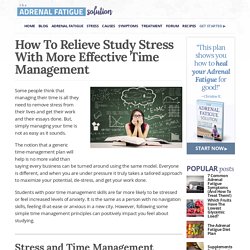
But, simply managing your time is not as easy as it sounds. The notion that a generic time-management plan will help is no more valid than saying every business can be turned around using the same model. Everyone is different, and when you are under pressure it truly takes a tailored approach to maximize your potential, de-stress, and get your work done. Students with poor time management skills are far more likely to be stressed or feel increased levels of anxiety. It is the same as a person with no navigation skills, feeling ill-at-ease or anxious in a new city. Exercise and immunity. Therapy & Counseling for Stress Management. There are many healthy ways to relieve stress.
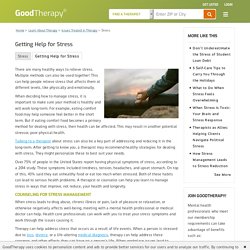
Multiple methods can also be used together! This can help people relieve stress that affects them at different levels, like physically and emotionally. When deciding how to manage stress, it is important to make sure your method is healthy and will work long-term. For example, eating comfort food may help someone feel better in the short term. But if eating comfort food becomes a primary method for dealing with stress, their health can be affected. Talking to a therapist about stress can also be a key part of addressing and reducing it in the long-term.
Over 75% of people in the United States report having physical symptoms of stress, according to a 2014 study. How to Manage School Stress - ft. Study With Jess.